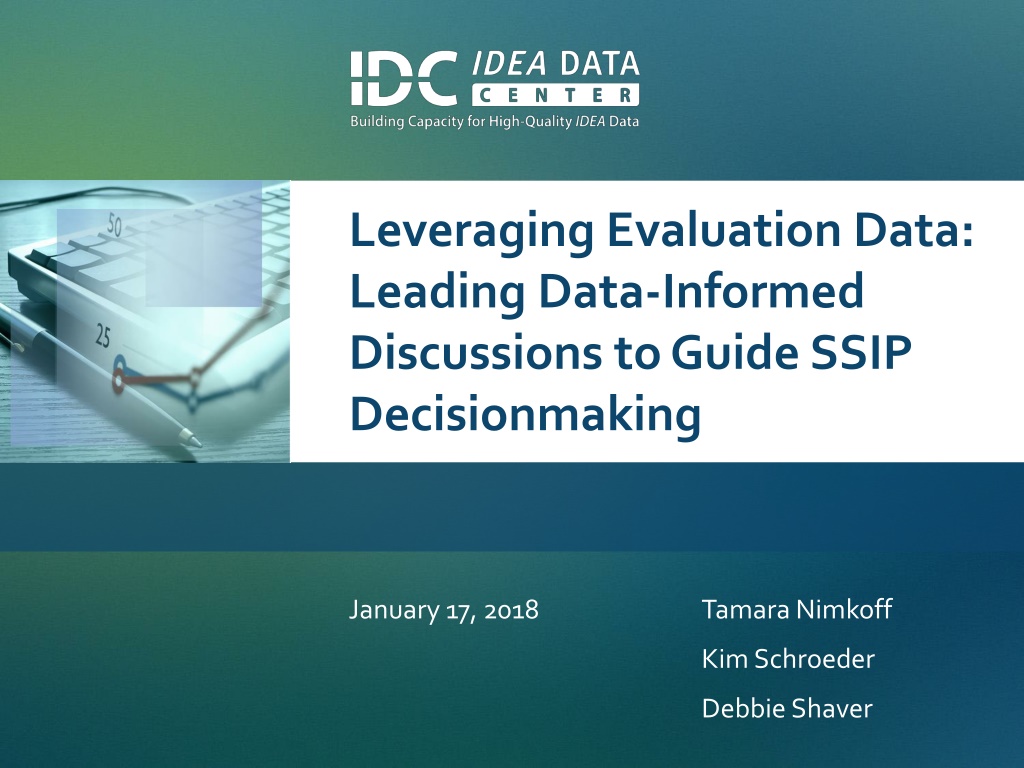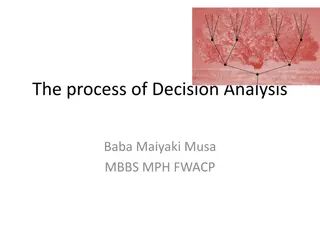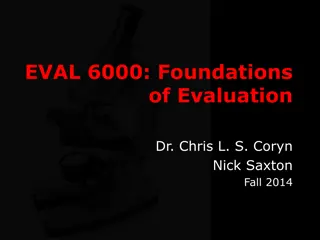Leveraging Evaluation Data for Data-Informed Decision-Making
Participants will enhance their understanding of the value of data discussions for assessing progress and guiding decision-making in the State Systemic Improvement Plan (SSIP). The session will cover leveraging data for decision-making, utilizing the IDC Data Meeting Protocol, and examples of protocol use. Attendees will learn to assess progress in SSIP Phase III, Year 2, through evaluation results, make data-informed decisions, and improve data quality. The importance of a structured data meeting protocol to facilitate focused discussions around SSIP data will also be emphasized.
Download Presentation

Please find below an Image/Link to download the presentation.
The content on the website is provided AS IS for your information and personal use only. It may not be sold, licensed, or shared on other websites without obtaining consent from the author. Download presentation by click this link. If you encounter any issues during the download, it is possible that the publisher has removed the file from their server.
E N D
Presentation Transcript
Leveraging Evaluation Data: Leading Data-Informed Discussions to Guide SSIP Decisionmaking January 17, 2018 Tamara Nimkoff Kim Schroeder Debbie Shaver
Intended outcomes Participants will increase their understanding of The value of data discussions for assessing progress toward achieving intended outcomes and informing decisionmaking A structured process that groups can use to guide next steps in State Systemic Improvement Plan (SSIP) implementation IDC s Data Meeting Protocol and related resources available to support data analysis and use 1
Agenda Assessing progress in SSIP Phase III, Year 2 Leveraging your data for decisionmaking Overview of the IDC Data Meeting Protocol Examples of protocol use Resources for data-informed decisionmaking 2
Assessing progress in SSIP Phase III, Year 2 Use evaluation results to assess progress implementing the SSIP Assess both short-term and intermediate outcomes to gauge progress toward the State-identified Measurable Result (SiMR) Make data-informed decisions in SSIP strategies and activities (See the State Performance Plan/Annual Performance Report [SPP/APR] Measurement Table) 3
Leveraging your data Power of data-informed decisionmaking Make decisions about resource allocation and target areas for program and service improvement Build awareness, interest, and skills for the routine use of data Ensure that data have value to the agency Support improved data quality 4
IDC Data Meeting Protocol One strategy for supporting data-informed decisions is through focused discussions about your SSIP data 5
Why a data meeting protocol? Provides a simple structure to guide conversation around evaluation data during meetings Helps groups examine evaluation results and make meaning of the results together Supports the analysis and use of evaluation data to inform continuous improvement 6
Who is this protocol for? Anyone engaged in making decisions for improvement efforts, such as the SSIP State staff involved in SSIP implementation or evaluation Local staff involved in SSIP Partners such as professional development providers Stakeholders such as state advisory groups, organizations representing constituents, and families 7
What key roles are involved? Protocol lead Has key responsibilities both before and after the meeting Can be one or more individuals Facilitator Guides participants through the group discussion process during the meeting Can be internal staff or outside support Other roles: notetaker, timekeeper 8
How might the protocol be used? Can be used during a single meeting or a series of meetings as part of a recurring decisionmaking process Can be used to facilitate discussions about data related to A program s processes and implementation The extent to which a program achieves its expected outcomes 9
What is the protocol process? Before the meeting During the meeting After the meeting Protocol lead plans and prepares for the meeting Facilitator guides participant discussion based on the data Protocol lead provides recap of the meeting and next steps 10
Protocol steps: Before the meeting 1. Determine the Objective 2. Identify the Data 3. Identify Participants and Key Responsibilities 4. Organize the Data to Present 5. Prepare and Distribute the Agenda 11
Protocol steps: During the meeting 1. Introductions and Key Messages 2. Present the Data 3-5. Discuss the Data 6. Determine Next Steps for the Group 7. Reflect on the Meeting s Effectiveness 12
Steps 3-5: Discussing the data 3. Discuss Observations of the Data What do you see? What are your initial thoughts or reactions? What do these data not provide? 4. Discuss Interpretations of the Data What do the data tell you? What answers are you getting for our original evaluation questions? What do these data confirm? 5. Discuss Implications of the Data What are the implications? So what? Why does this matter? What does this mean for the work? 13
Example: Has family engagement increased over time? Percentage of families within each district who report active engagement with their child s school Spring 2016 Spring 2017 85 85 75 70 60 60 60 45 District 1 District 2 District 3 District 4 14
Example: Discussing the data District 1 reported 70 percent engagement in 2016 and 85 percent in 2017 2 of the other 3 districts also saw an increase in family engagement from 2016 to 2017 Observations of the Data Interpretation of the Data Overall, family engagement increased from 2016 to 2017 Implication of the Data We need more data to determine why Districts 1,2, and 3 have seen an increase and why District 4 has not seen an increase in family engagement 15
Protocol steps: After the meeting 1. Distribute Notes From the Protocol Process 2. Confirm Next Steps and Timeline for Additional Actions 16
Example 1 of protocol in use: New Mexico Part B SSIP focus: Improved reading achievement for students with disabilities in Results Driven Accountability (RDA) schools Discussion objective (evaluation question): To what extent are RDA (SSIP) schools implementing the evidence- based practices that are expected to result in improved outcomes for students with disabilities? 17
New Mexicos protocol use Data: Site visit implementation rubric (collected through interviews and observations across multiple practice domains) Protocol roles: State staff and IDC technical assistance (TA) provider collaborated as protocol leads, and IDC TA provider facilitated the data meetings Meeting participants: Meeting #1: State staff involved in SSIP implementation and evaluation Meeting #2: Various state staff and SSIP stakeholders (principals, professional development provider) 18
Example 2 of protocol in use: New Hampshire Part B SSIP focus: Improved social-emotional outcomes for preschool children with disabilities through complementary infrastructure development and leadership Discussion objective (evaluation questions): What is the status of practitioner fidelity of implementation? What are the implications for coaching infrastructure moving forward? What were the most valuable components of process coaching during the 2016-17 implementation year? What value did process coaching contribute to implementation teams? What additional supports are needed for the coaches and the implementation teams? 19
New Hampshires protocol use Data: Fidelity of Implementation Observation tool Process Coach Feedback Survey Protocol roles: State staff served as protocol leads with IDC TA provider support, and state and local staff facilitated the data meetings Meeting participants: Meetings #1 and #2: State leadership team Meeting #3: Local leadership and implementation teams 20
Summary IDC s Data Meeting Protocol provides a structured process that groups can use to Conduct data discussions Assess progress toward achieving intended outcomes Inform next steps in SSIP implementation https://ideadata.org/resources/resource/1758/data- meeting-protocol 21
Related resources Individualized TA support with protocol Contact your IDC state liaison Forthcoming facilitators guide for using data with stakeholders Upcoming Event: Interactive Institutes 2018: Building a Culture of High-Quality Part B Data Registration Deadline: January 19th 22
For more information Visit the IDC website http://ideadata.org/ Follow us on Twitter https://twitter.com/ideadatacenter Follow us on LinkedIn http://www.linkedin.com/company/idea -data-center 23
The contents of this presentation were developed under a grant from the U.S. Department of Education, #H373Y130002. However, the contents do not necessarily represent the policy of the U.S. Department of Education, and you should not assume endorsement by the federal government. Project Officers: Richelle Davis and Meredith Miceli 24























